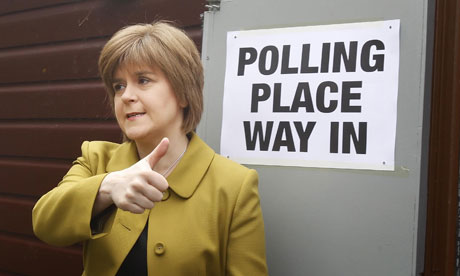|
British Prime Minister David Cameron last night signed off on the holding of a referendum in the weeks after the Glasgow Games, where local athletes will compete under a Scottish flag, unlike at the London Olympics where they were part of "Great Britain" or "Team GB".
The agreement between the Mr Cameron and Alec Salmond, the pro-independence First Minister of Scotland, is a historic move, as the 5.25 million people living in Scotland will have the chance to undo the 1707 Treaty of Union that merged the kingdoms of England and Scotland.
Lengthy bartering between the two governments over the past eight months saw Mr Salmond win the right to control the timing of the ballot and he promptly rejected Mr Cameron's call for the referendum to be held as soon as possible.
He plans a series of events to mark the 700th anniversary on June 24, 2014, of the Scottish victory over England at the Battle of Bannockburn, and from July 23 to August 3, the Commonwealth Games will have Scots barracking for their team against England and the other "home nations" Wales and Northern Ireland as well as Australia and other members of the Commonwealth.With opinion polls showing as few as 28 per cent of people now support independence, Mr Salmond wants as much time as possible to change public opinion, and the second half of 2014 offers some unique opportunities to heighten Scottish nationalism.
Despite Mr Salmond's victory on the timing of the ballot, Mr Cameron's negotiating team came out on top over the single most important issue, the matter of how many questions will appear on the ballot paper.
Knowing most Scots are currently likely to vote no to the question of full independence, Mr Salmond's Scottish National Party had hoped to put a fall-back option on the ballot paper by including a second question asking whether they wanted to see the devolution of more government powers from Britain to Scotland if it remained within the UK.
Mr Cameron refused to budge on that issue, forcing the SNP to accept that the ballot paper would include a single "in or out" question about Scotland's future in the UK.
Former Labour chancellor Alistair Darling, who is leading the anti-independence Better Together campaign, said he was pleased the deal had been reached. "The key thing at stake in these negotiations was to get the single question," he said.
Mr Salmond had two smaller victories in the referendum negotiations, winning the right to extend the referendum vote to 16 and 17 year olds, and ensuring that the devolved Scottish parliament would oversee the phrasing of the referendum question.
The SNP has a clear majority in the parliament but the final choice of question will have to be cleared as fair by the UK Electoral Commission.
Last night's signing in Edinburgh of the referendum deal means the two sides can now concentrate on debating issues such as whether Scotland, which has only 8.3 per cent of the British population, would be more prosperous if it controlled its own taxes and foreign relations.
Mr Salmond proposes retaining the Queen as the head of state of an independent Scotland, keeping the pound sterling and staying within the EU and NATO.
Opponents say Scotland would need to apply for EU membership, a process that could see it forced to adopt the euro as its currency.
Mr Cameron said he wanted the debate to be vigorous and honest. "Scotland's two governments have come together to deliver a referendum which will be legal, fair and decisive," he said.
"This marks the beginning of an important chapter in Scotland's story and allows the real debate to begin. It paves the way so that the biggest question of all can be settled: a separate Scotland or a united kingdom?
"It is now up to the people of Scotland to make that historic decision."

